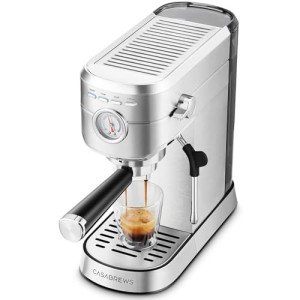The Rise of Home Espresso Machines: A Comprehensive Guide
As coffee enthusiasts continue to look for fresh and delicious brews at home, the popularity of home espresso machines has surged in recent years. No longer simply the domain of cafes and cafe, these machines empower individuals to craft barista-quality espresso beverages from the comfort of their cooking areas. This short article will explore the different kinds of home espresso machines, their features, and factors to consider for choosing the best one. In addition, it will offer a selection of FAQs to assist potential buyers make informed choices.
Kinds Of Home Espresso Machines
Home espresso machines can be classified into a number of categories based upon their mechanisms and user-friendliness. Each type has its distinct features, pros, and cons.
| Type | Description | Pros | Cons |
|---|---|---|---|
| Manual Espresso Machines | Needs the user to by hand manage the brewing process, including techniques like pulling a lever to create pressure. | - Complete control over developing process - Compact design | - Requires ability and practice - Time-consuming |
| Semi-Automatic Machines | Machine automates water circulation and pressure, but the user still controls the dosing and period of the brewing process. | - Balance of automation and control - Versatile | - Learning curve for refining techniques |
| Fully Automatic Machines | Automates the whole developing procedure, from grinding to developing, typically with programmable settings for personalized drinks. | - Extremely user-friendly - Quick and practical | - Less control over the developing procedure - Higher rate point |
| Capsule or Pod Machines | Utilizes pre-packaged espresso pills or pods to develop coffee quickly and quickly. | - Extremely simple to use - Minimal cleanup | - Limited flavor range - More expensive per cup than ground coffee |
| Super-Automatic Machines | Integrates features of fully automatic machines with integrated mills, permitting users to brew whole bean espresso and milk-based beverages with one touch. | - All-in-one benefit - Ideal for milk-based beverages | - Often the most expensive - Can be bulky |
Functions to Consider
When picking a home espresso machine, potential buyers must consider the following functions to ensure they select a machine that satisfies their needs:
Grinder Type:
- Built-in mills can offer fresher premises but may require more upkeep.
- Different mills enable more personalization of grind size.
Pressure:
- Look for machines that produce a minimum of nine bars of pressure, which is optimal for brewing espresso.
Water Temperature Control:
- Machines with adjustable temperature level settings allow for much better extraction of taste from beans.
Milk Frothing Options:
- Consider whether you desire a manual steam wand for frothing or an automatic milk frother for benefit.
Ease of Cleaning:
- Machines with detachable parts and self-cleaning functions substantially decrease clean-up time.
Size and Design:
- Ensure the machine fits easily in your kitchen area and aligns with your aesthetic choices.
Budget:
- Set a budget before starting your search, as prices can range significantly from affordable models to high-end machines.
Advantages of Home Espresso Machines
Owning a home espresso machine offers numerous advantages:
- Cost-Effective: Over time, developing espresso in your home can save coffee lovers cash compared to regular café gos to.
- Customization: Users can explore various beans, grind sizes, and brewing methods to discover their ideal cup.
- Convenience: The ability to brew espresso whenever removes the need to go out to a coffee shop, especially helpful throughout late nights or mornings.
- Quality assurance: With a home machine, people have total control over the quality of ingredients and brewing procedures.
Disadvantages of Home Espresso Machines
Nevertheless, there are some disadvantages to consider:
- Initial Investment: High-quality espresso machines can be expensive, needing a significant in advance investment.
- Learning Curve: Mastering the art of espresso developing can take time and practice, which may be frightening for beginners.
- Maintenance: Like any device, espresso machines need regular cleaning and upkeep to ensure ideal performance.
Frequently asked questions
1. What is the very best kind of home espresso machine for newbies?
Answer: For novices, a semi-automatic machine is frequently recommended as it offers a balance between control and automation, enabling you to find out the fundamentals without overwhelming complexity.
2. How Black Espresso Machines should I invest on a home espresso machine?
Answer: Entry-level machines can start around ₤ 100 to ₤ 300, while higher-end designs can vary from ₤ 500 to over ₤ 2000. It's necessary to set a budget based upon your anticipated usage and preferred features.
3. Do I need a separate grinder?
Response: While some espresso machines feature integrated mills, buying a separate grinder enables greater modification and guarantees better quality grounds.
4. How typically should I clean my espresso machine?
Response: Cleaning frequency can differ by machine type, however it's usually suggested to clean the machine after each use and carry out deep cleansings weekly or month-to-month, depending upon usage.
5. Can I make milk-based beverages with any espresso machine?
Answer: Not all machines feature milk frothing capabilities. If you enjoy beverages like lattes or coffees, look for a machine with a steam wand or automatic frother.
Home espresso machines are transforming the way coffee connoisseurs enjoy their precious brews. With different types and advanced features readily available in the market, there is something for everybody. Whether it's the joy of producing distinct dishes or just relishing the best shot of espresso, buying a home espresso machine can boost both the coffee-drinking experience and the quality of life for coffee fans everywhere. As with any investment, it is crucial to weigh the advantages versus the potential drawbacks and pick a machine that flawlessly fits both your way of life and preferences.

